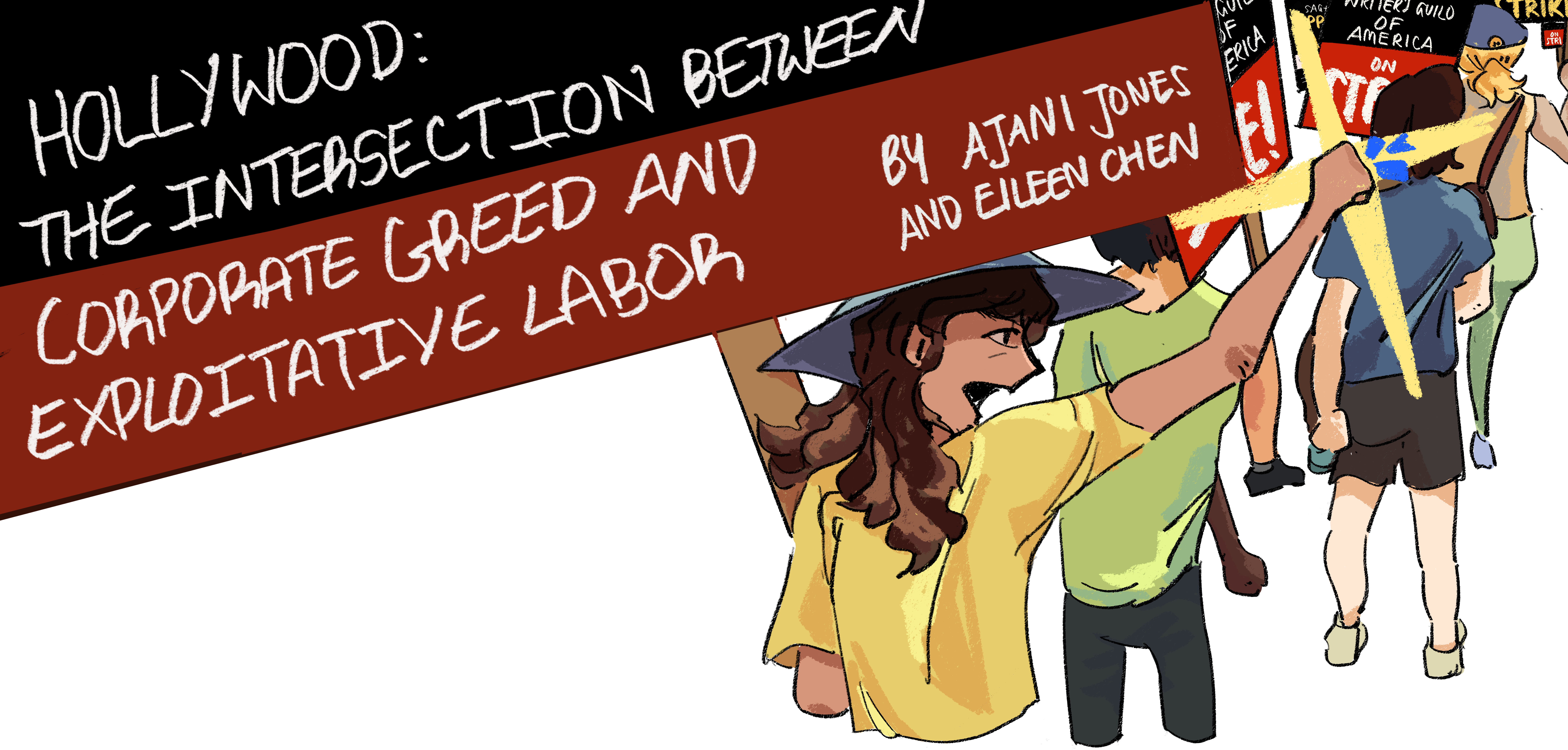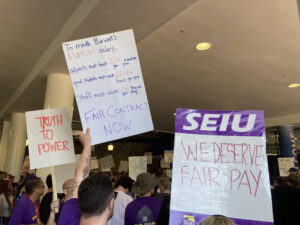As the Barbenheimer hype took summer theaters by storm, a different groundbreaking phenomenon swept through the entertainment industry. In a historic walkout, writers and actors are drawing the picket lines and fighting for higher pay and better protections in Hollywood.
The Writers Guild of America (WGA) went on strike almost four months ago on May 2, followed by the Screen Actors Guild and American Federation of Television and Radio Artists (SAG-AFTRA) on July 14. Both organizations walked out after contract negotiations with the Alliance of Motion Picture and Television Producers (AMPTP) failed to produce satisfactory agreements.
Both WGA and SAG-AFTRA have published a comprehensive list of similar demands that the AMPTP has failed to meet. These include higher financial compensation from streaming, industry guidelines for using artificial intelligence, and standard worker protections. Critically, SAG-AFTRA highlighted that pension and healthcare contribution ceilings for actors have not increased in 40 years to account for inflation—a particularly vicious fact given that only 12 percent of union members currently qualify for health insurance. Regarding AI regulation, WGA is open to employing AI tools in the writing process but wants to ensure that writers won’t consequently lose credit or residuals; for their part, SAG-AFTRA is fighting to protect actors’ likenesses from being artificially reproduced without consent and compensation.
These demands aren’t excessive—they’re long overdue. But the AMPTP is labeling them impractical: Disney’s CEO, Bob Iger, accused the unions of being unrealistic, referring to their decision to strike as “disturbing.” But in July, SAG-AFTRA granted interim agreements to 39 independent projects. These agreements permit actors to continue filming with certain non-AMPTP-affiliated projects, including two films from A24. If an independent studio like A24 could meet every demand, it’s unclear why the world’s biggest entertainment companies find them unreasonable.
This walkout marks the first joint strike of Hollywood’s writers and actors in over 60 years. In 1960, SAG (not yet merged with AFTRA) joined the month-long WGA strike in a landmark double strike that won salary raises and a pension system. It also standardized the pay structure of residuals, ensuring writers and actors would receive a percentage of income made from reruns or other airings after initial release.
Multiple separate writers’ and actors’ strikes have followed since, but none have been as pivotal as the one happening now. While television redefined entertainment industry work in 1960, streaming services and artificial intelligence are the 2023 strikers’ main grievances—eerily resonant of past existential concerns surrounding Hollywood employment under disruptive technology.
As of writing, major studios like Disney and Paramount have adamantly refused to meet both unions’ demands. In her speech announcing SAG-AFTRA’s strike, President Fran Drescher likened the AMPTP’s behavior at the negotiation table to moving around furniture on the Titanic—superficial and futile. Choosing to walk off set wasn’t a decision made lightly, but a commitment driven by the fact that while Hollywood’s business models have radically changed, employee contracts have not, trapping workers on a sinking ship.
While the lack of movement from these big studios is indicative of larger issues in entertainment, it is the alleged actions of these studios outside the negotiation rooms that truly reflect their intransigence. Universal Studios allegedly illegally trimming trees that provided shade to picketing guild members amid record-breaking heat waves is only one of several instances of suspected anti-strike efforts. Shady tactics like this make one thing clear: studios and their executives lack empathy and would rather force the two unions into a stalemate than attempt to compromise. Moreover, the coincidental push to raise streaming prices reinforces long-standing narratives that wrongly place the cost of fair labor practices on consumers.
In spite of these suspect practices, members of both unions remain steadfast in their commitment to uphold the strike, even though many members have already begun to feel the financial impact. In an interview with Evening Standard, Tony-award winner Billy Porter shared that he had to sell his home in California.
“The life of an artist, until you make fuck-you money—which I haven’t made yet—is still check-to-check,” he said.
Audiences have also started feeling the effects of the strike, although in less impactful ways. The upcoming months (and potentially more if the studios refuse to budge) pose an unprecedented drought for Hollywood entertainment—especially ironic given the streaming price hikes. Award shows have already been postponed several months in advance, and future releases have seen multiple delays amid the halt in production.
Promotional interviews and red-carpet appearances from stars have also noticeably disappeared. For instance, the red carpet premiere of Oppenheimer (2023) saw the entire cast walk out in solidarity with the SAG-AFTRA strike. Still, the big studios remain the least impacted and have the most to gain if the strikes are unsuccessful as they will continue to find other avenues to make a profit, taking advantage of non-unionized influencers.
Recognizing the weight of these strikes and what is at stake, we as viewers have a certain responsibility to support the unions in their fight—we can donate to the Entertainment Community Fund or join picket lines. But even if the strikes are successful in the short term, the conversation surrounding fair compensation in Hollywood cannot end there.
Real change needs to be implemented to reflect the conditions of an ever-evolving entertainment industry. Writers and actors should not only be justly compensated for their worth, but they should also receive fair protections from the non-consensual replication of their likenesses in a world where the capabilities of AI stray closer to science fiction every day.
Other Hollywood factions, such as VFX artists and reality TV stars, are also beginning the process of unionizing. As more issues within the entertainment industry garner attention in the public eye, the corporate greed at the root of these predatory labor practices has been brought further into the spotlight. While each day raises the stakes for those at the picket line, their call to action can be amplified. At this crossroads, only a complete overhaul of Hollywood’s flawed labor system can do strikers justice.






